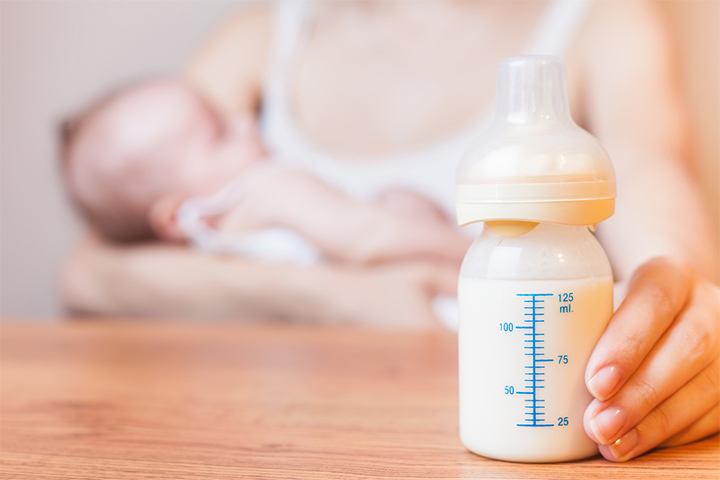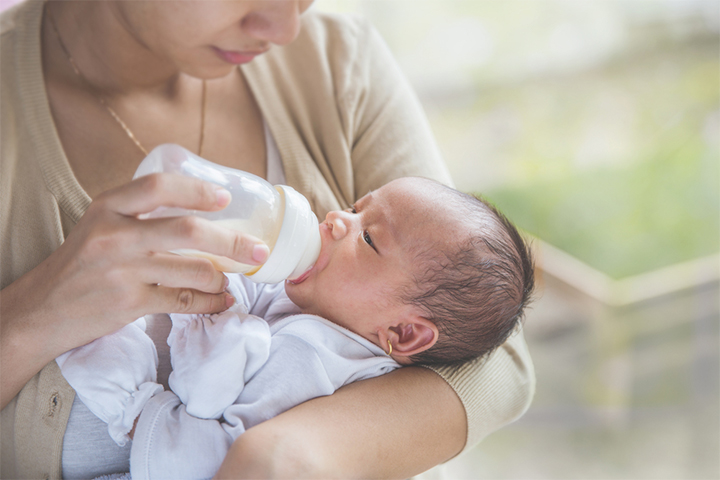
Image: ShutterStock
Breastmilk or mother’s milk is the best source of nutrition for a newborn. However, breastfeeding is not always a feasible option; hence, some mothers resort to formula feeding. But how much formula does your baby need? We will address this question in this article.
Some new moms may not breastfeed their babies due to various underlying health reasons leading to insufficient milk production. In such a scenario, your pediatrician may recommend feeding formula to your baby. However, you must be aware of the ideal dosages and intervals to feed formula to your baby to ensure they get adequate nourishment daily.
Keep reading to understand how much formula your baby needs, whether the feeding pattern is different from formula-fed and breastfed babies, the signs your baby is getting insufficient formula, and some tips to remember during a formula-feeding session.
How Much Formula Does Your Baby Need?
Image: Shutterstock
The quantity of formula required by your baby depends on their age and weight. But do not start formula feeds before talking to a doctor, and only feed as per their recommendations.
Formula feeding as per baby’s age
The following formula feeding chart gives the quantity of prepared formula a baby needs and the number of times they require it in a day (1):
| Age of the baby | Quantity of formula per day | Total number of feeds in a day |
|---|---|---|
| 1 month | 12-32oz (355-946ml) | 6-8 times |
| 2 months | 25-32oz (740-946ml) | 5-6 times |
| 3-5 months | 30-32oz (887-946ml) | 5-6 times |
| 4-6 months | 28-32oz (828-946ml) | 4-6 times |
| 7 months | 30-32oz (887-946ml) | 3-5 times |
| 8 months | 30-32oz (887-946ml) | 3-5 times |
| 9 months | 30-32oz (887-946ml) | 3-5 times |
| 10-12 months | 24-30oz (710-887ml) | 3-4 times |
Note: The nutrition requirements of babies may vary, which will affect the number of feeds and their frequency per day. For specific quantities per feed, talk to the baby’s pediatrician.
 Caution
CautionCan You Formula Feed The Baby As Per Their Weight?
The age of the baby is the ideal determinant for the serving or quantity of formula they need. However, the American Academy of Pediatrics recommends the amount of formula for babies based on body weight. According to the AAP, a baby needs 2.5oz (75ml) of formula in 24 hours, for every 1lb (453g) of their body weight (2).
Do Formula-fed Babies Feed Less Frequently Than Breastfed Infants?
Image: Shutterstock
Yes. Breastfed infants take smaller but frequent feeds when compared to their formula-fed counterparts who tend to go longer between feeds (3). For the first few weeks after birth, a breastfeeding baby may feed every couple of hours daily, while a formula-fed baby could have a gap of four hours because the formula takes longer than breast milk to digest, keeping the baby fuller for long, while the breastfed child becomes hungry sooner (4).
How Do You Know That The Baby Is Getting Sufficient Formula?
Image: Shutterstock
Here are the signs that your baby is getting sufficient formula (5):
- Timely bowel movement and urination: You will see soiled diapers at a set frequency, which suggests that the baby is eating enough.
- Is not cranky or fussy after the feed: A baby will get irritated and cry if they are still hungry. So if your baby is getting sufficient formula, then they will not be fussy after feeding.
 Quick fact
Quick fact- Sound sleep: A hungry baby will have a disturbed sleeping regime. If the baby is otherwise healthy but does not sleep properly, then it could be that his/her tummy is not full.
 Point to consider
Point to consider- Healthy growth and development: In the long term, a baby who gets sufficient formula will thrive and attain all the developmental milestones.
Formula feeding is unlike breastfeeding and requires additional care to prevent under or over feeding.
What Are The Points To Remember For Formula Feeding?
Image: Shutterstock
Here is what you must keep in mind when you are formula feeding your baby:
- Each baby has different nutritional requirements. Not all babies of a particular age need the same amount of formula. Some babies may need less, and some may need more. So, feeding a baby on demand can be an ideal option.
- Do not force the baby to finish the bottle. It is okay if your baby leaves some formula in the bottle. Discard the leftovers and make a fresh batch for the next feeding session. Unlike breastfeeding, where the baby only drinks as much as they need, formula-feeding runs the risk of overfeeding.
- Consult a doctor if the baby demands more than 32oz (946ml) a day. According to the guidelines by pediatric experts, a baby should not have more than 32oz (946ml) a day, until the age of 12 months. It is unlikely a baby will need more than the suggested quantity, but if the baby demands it, consult your doctor before proceeding.
 Quick tip
Quick tipFrequently Asked Questions
1. Can you overfeed a formula-fed baby?
Yes, it is easier to overfeed a bottle-fed baby because they cannot control the milk flow from a bottle as easily as they can while breastfeeding. When babies are nursing at the breast, they can control the milk flow by sucking and pausing. However, when feeding from a bottle, milk can flow more quickly and continuously, leading to overfeeding and discomfort for the baby.
Buy bottle nipples that closely mimic the natural milk flow from the breast. Additionally, measure the formula appropriately and prepare portions per feed as your pediatrician recommends to prevent overfeeding.
2. How much formula do I buy a month?
The amount of formula you need weekly or monthly depends on many factors, such as the baby’s age, appetite, and whether or not breastmilk is also given. You may need less formula once the baby is six months old and begins to eat solids.
3. Is 4oz of formula too much for a newborn?
The formula consumption among babies shouldn’t be more than one or 2 oz or 30 to 60ml of formula per feed in the first week of life (2).
4. What will happen if I overfeed formula to my baby?
Overfeeding formula to your baby may cause vomiting, irritability, stomach cramps, sleep problems, and discomfort in the stomach (6).
5. Can I leave the baby formula outside for more than two hours?
Leaving prepared baby formula out at room temperature might cause it to deteriorate. You should use the prepared baby formula within one to two hours after preparation and the start of feeding. You may also refrigerate and use it within 24 hours (9).
6. Can formula feeding increase my baby’s weight?
Studies have shown that formula-fed babies may gain more weight than breast-fed babies (10). In some instances, doctors advise giving formula to babies when they aren’t gaining proper weight (11). However, the formula should not be used as a replacement for breast milk without the doctor’s advice just to increase the baby’s weight.
The typical formula milk demand for 1lb (453g) of body weight of a baby is 2.5oz (75ml) per 24 hours, but this might vary depending on the baby’s age and weight. When compared to breastfed babies, formula-fed babies go longer between feeds and require more attention to avoid under or over-feeding. Therefore, see a pediatrician to determine the appropriate amount of formula milk for your baby and take any necessary precautions. Once your baby transitions to solid foods, they’ll become less reliant on the formula for nourishment.
Infographic: Points To Remember When Formula Feeding A Baby
Many mothers may transition from breast milk to formula or give formula as their baby’s primary food source. In either case, they may wonder about various things to consider when giving formula to their infant. The tips in this infographic can guide you with the vital points to remember when formula feeding a baby. Illustration: Momjunction Design Team
Key Pointers
- A baby’s formula needs are determined by their age and weight.
- Consulting with a doctor before starting formula feedings is crucial.
- Signs of a baby receiving sufficient formula include timely bowel movements and urination, being content after eating, healthy growth, and sound sleep.
- Special care should be taken when formula feeding to avoid under or overfeeding.
- It is important to consider a baby’s individual nutritional requirements and always follow the doctor’s recommendations instead of making the baby finish the bottle.

Image: Dall·E/MomJunction Design Team
Contemplating feeding your little one with formula or milk, but worried about the right amount? Check out the video below to find the answer to it and learn some handy tips.
References
1. Feeding Guide for the First Year; Johns Hopkins Medicine
2. Amount and Schedule of Formula Feedings; American Academy of Pediatrics(2018)
3. K. Boyse; Feeding Your Baby and Toddler (Birth to Age Two); University Of Michigan (2018)
4. Breastfeeding vs. Formula Feeding; Brenner Children’s Hospital
5. Breastfeeding takes patience and practice at first. With the right support and information you can make it work; U.S. Department of Health and Human Services
6. Formula feeding FAQs;; Tommy’s
7. How to Safely Prepare Baby Formula With Water; American Academy of Pediatrics
8. Formula milk: common questions; NHS, UK
9. Infant Formula Preparation and Storage: CDC
10. Growth of breast-fed and formula-fed infants: NCBI
11. Supplementing breastfeeding with formula: University of Utah






















